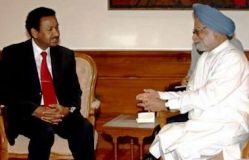Sudan backs India’s permanent membership of Security Council
NEW DELHI, June 8, 2005 (UNI) — India and the Sudan have underlined the need for ”urgent and meaningful reforms” of the UN and its organs, including the Security Council, while Sudan supported India’s early entry into the UNSC as a permanent member.

|
|
Indian Prime Minister Manmohan Singh (R) speaks with Sudan’s Foreign Minister Mustafa Osman Ismail during their meeting in New Delhi June 7, 2005. (Reuters). |
The two countries also stressed that the UNSC should reflect the needs of developing countries while Sudan conveyed to India the African position reached at the Ministerial meeting in Swaziland on the question of UN reforms.
India also committed to provide 3500 troops to the UN Mission in The Sudan (UNMIS).
A Joint Statement issued after the conclusion of the three-day official visit of Sudanese Foreign Minister Dr. Mustafa Osman Ismail to India said both countries had also agreed to strengthen areas of cooperation between them.
This is in keeping with the tradition of high level visits between the two countries including that of President A P J Abdul Kalam to Sudan in October, 2003 and of the Sudanese Interior Minister Maj. Gen. Engineer Abdulrahim Mohamed Hussein to India in January, 2005.
During his three-day visit Dr. Ismail called on Prime Minister Manmohan Singh and handed over a written message from Sudanese President Omar Hassan Al Bashir.
He also met External Affairs Minister Natwar Singh and had wide-ranging discussions on bilateral, regional and multilateral issues.
The Sudanese Foreign Minister briefed the Indian leaders on the internal situation in Darfur. India reiterated its position that the situation in Darfur is an internal crisis that has to be resolved by the Government of Sudan in consultation with the AU.
India appreciated the efforts of the Government of Sudan in consultation with the AU in bringing the situation to normalcy.
India, in response to the humanitarian crisis, had given 20,000 tonnes of wheat and said New Delhi was not in favour of sanctions which could be counter-productive.
India has also made a significant investment in the oil sector in The Sudan. Discussions also covered enhanced bilateral cooperation in the hydrocarbon, power, small-scale industries, civil aviation, agriculture, infrastructure, IT, health care, pharmaceuticals and other development-related sectors. It was agreed to look at ways and means of strengthening the framework and expanding areas of cooperation.
Dr Ismail and his delegation interacted with Indian public and private sector organisations and companies dealing with major infrastructure, hydro-carbon, power, IT and other sectors as well as with business organisations, FICCI, CII and ASSOCHAM.
The next session of the Joint Commission at the level of Foreign Ministers will be convened in the later half of 2005.
The Indian and Sudanese leaders also discussed regional issues including Palestine and Iraq. The Indian leaders briefed the Sudanese Foreign Minister on the various steps undertaken to improve India’s multi-faceted relations with its neighbours.
